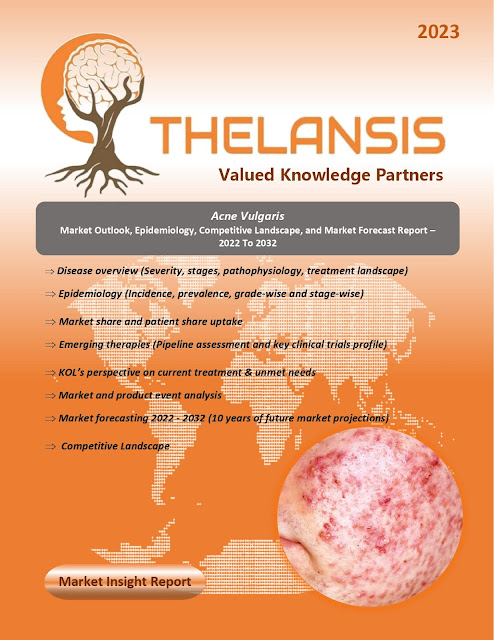IDH1-mutated Relapsed or Refractory Myelodysplastic Syndromes (MDS) – Market Outlook, Epidemiology, Competitive Landscape, and Market Forecast Report – 2023 To 2033
The gene Isocitrate dehydrogenase 1 (IDH1) encodes the protein isocitrate dehydrogenase 1, an enzymatic component of the citric acid cycle. This enzyme facilitates the carboxylation process of isocitrate, leading to alpha-ketoglutarate formation. Recurrent mutations in the IDH1 gene have been observed in 12% of glioblastoma patients and 70% of patients diagnosed with WHO grade II and III astrocytomas and oligodendrogliomas. Within these contexts, the IDH1 mutations target a specific amino acid residue at position 132, causing a substitution from arginine to histidine (R132H). The clinical significance of IDH1 mutations in patients with myelodysplastic syndromes (MDS) remains inadequately understood. The IDH1 enzyme is synthesized based on the genetic instructions present in the IDH1 gene, located on chromosome 2q33.3. The enzyme is situated in both the cytoplasm and peroxisomes. Ordinarily, the IDH1 gene encodes an enzyme reliant on NADPH that facilitates the transformation of isocitrate into alpha-ketoglutarate. In the presence of IDH1 mutations, the enzyme's functionality is altered, producing the oncometabolite D2HG and subsequent accumulation. In acute myeloid leukemia (AML), the most frequently identified IDH1 mutation occurs at the Arg132 residue (R132). This alteration results in substituting the substrate-binding arginine with residues such as R132H, R132C, R132G, R132L, or R132S in the catalytic domain of the enzyme. The outcomes of R132 IDH1 mutations include DNA and histone hypermethylation and a hindrance in cellular differentiation, indicating the presence of leukemogenic myeloid progenitor cells. Both IDH1 and IDH2 mutations are correlated with older age and an unfavorable prognosis, particularly in AML cases characterized by a cytogenetically normal karyotype (CN-AML). Various other factors are associated with IDH1 mutations, including intermediate-risk cytogenetics, elevated platelet counts, higher percentages of bone marrow blasts during diagnosis, mutations in FLT3-ITD and NPM1, and, in rare instances, mutations linked to therapy-related AML, TET2, and WT1. Multiple methodologies, such as Sanger sequencing, PCR-based techniques, and next-generation sequencing (NGS), are employed to identify IDH mutations in patients with hematologic malignancies. Patients with IDH1-mutated relapsed or refractory MDS currently have no targeted therapy options, and outcomes are generally poor for those who experience disease progression after treatment with standard care.
Thelansis’s “IDH1-mutated Relapsed or Refractory Myelodysplastic Syndromes (MDS) Market Outlook, Epidemiology, Competitive Landscape, and Market Forecast Report – 2023 To 2033" covers disease overview, epidemiology, drug utilization, prescription share analysis, competitive landscape, clinical practice, regulatory landscape, patient share, market uptake, market forecast, and key market insights under the potential IDH1-mutated Relapsed or Refractory Myelodysplastic Syndromes (MDS) treatment modalities options for eight major markets (USA, Germany, France, Italy, Spain, UK, Japan, and China).
KOLs insights of IDH1-mutated Relapsed or Refractory Myelodysplastic Syndromes (MDS) across 8 MM market from the centre of Excellence/ Public/ Private hospitals participated in the study. Insights around current treatment landscape, epidemiology, clinical characteristics, future treatment paradigm, and Unmet needs.
IDH1-mutated Relapsed or Refractory Myelodysplastic Syndromes (MDS) Market Forecast Patient Based Forecast Model (MS. Excel Based Automated Dashboard), which Data Inputs with sourcing, Market Event, and Product Event, Country specific Forecast Model, Market uptake and patient share uptake, Attribute Analysis, Analog Analysis, Disease burden, and pricing scenario, Summary, and Insights.
Thelansis Competitive Intelligence (CI) practice has been established based on a deep understanding of the pharma/biotech business environment to provide an optimized support system to all levels of the decision-making process. It enables business leaders in forward-thinking and proactive decision-making. Thelansis supports scientific and commercial teams in seamless CI support by creating an AI/ ML-based technology-driven platform that manages the data flow from primary and secondary sources.
_page-0001.jpg)



Comments
Post a Comment